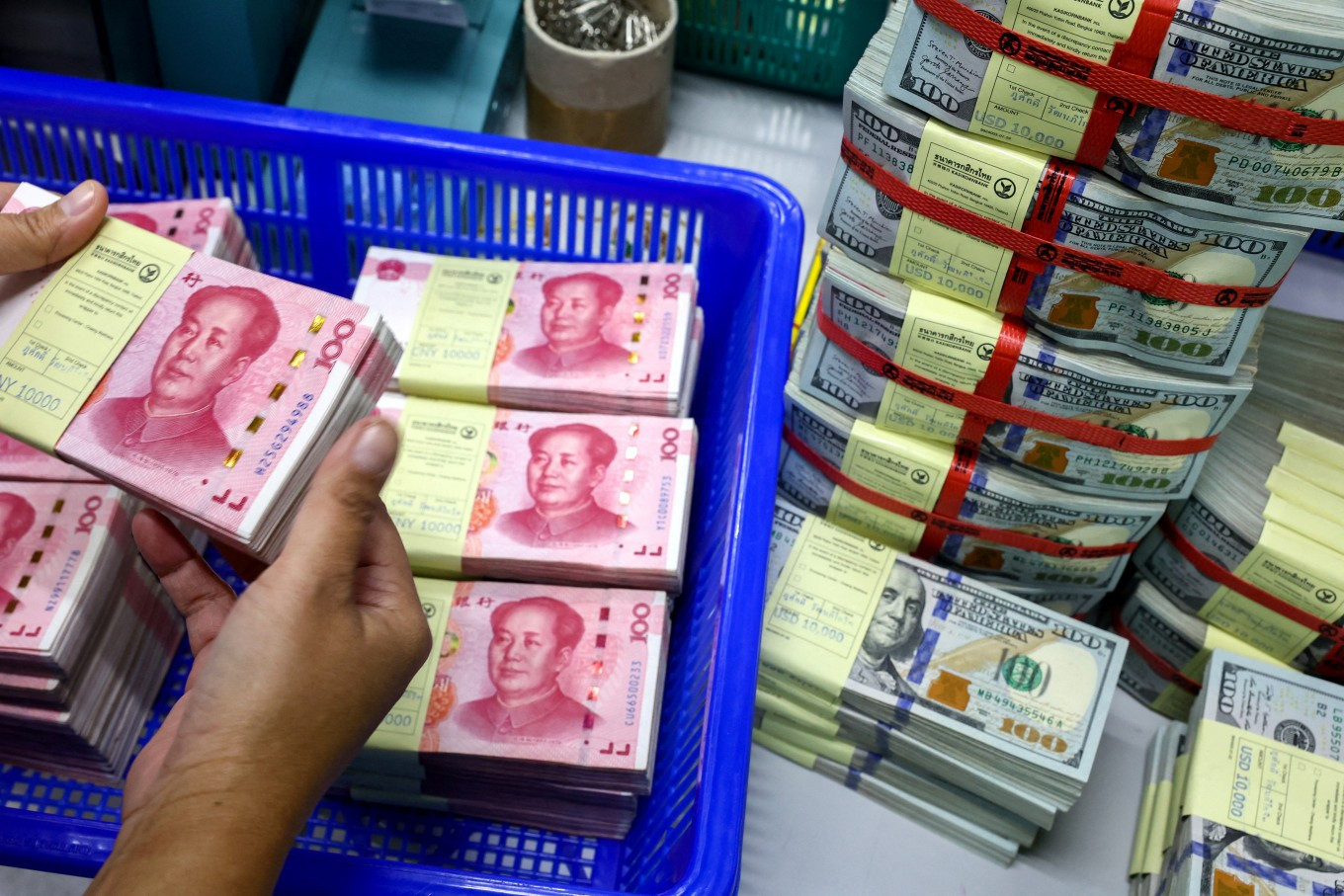News
Indonesia debuts dim sum bonds as it seeks to diversify funding sources
Tenggara Strategics November 7, 2025 A bank employee counts China's renminbi or yuan notes next to US dollar notes on Jan. 25, 2023, at a Kasikornbank branch in Bangkok. (Reuters/Athit Perawongmetha)
A bank employee counts China's renminbi or yuan notes next to US dollar notes on Jan. 25, 2023, at a Kasikornbank branch in Bangkok. (Reuters/Athit Perawongmetha)
Indonesia has successfully completed the issuance of its first-ever government bonds (SBN) denominated in Chinese renminbi, executed through offshore dim sum bonds. The issuance forms part of the government's strategy to diversify funding sources for the state budget. It follows earlier foreign-currency SBN issuances in 2025, including those denominated in Japanese yen (samurai bonds) and Australian dollars (kangaroo bonds). The debut of dim sum bonds coincided with a downward revision of the government's SBN issuance target for the fourth quarter of 2025.
The inaugural dim sum bond issuance by the Finance Ministry amounted to 6 billion yuan (Rp 14.02 trillion) consisting of two series: a five-year 3.5-billion-yuan RICNH1030 and a 10-year 2.5-billion-yuan RICNH1035. Issued on Oct. 23 and settled by Oct. 31, the bonds initially carried coupon rates of 2.95 percent and 3.3 percent per annum, respectively.
Indonesia's dim sum bonds received investment-grade ratings of Baa2 from Moody's and BBB each from Standard & Poor's (S&P) and Fitch's Ratings. They are set to be listed on the Singapore Exchange (SGX) through its securities trading division, with Bank of China, HSBC and Standard Chartered serving as joint lead managers for the bond issuance transactions. The Finance Ministry revealed that Asian investors, including Chinese ones, dominate book orders for the dim sum bonds. Proceeds will be used to finance the state budget.
Investor appetite proved strong. As of Oct. 23, orders reached 18 billion yuan (Rp 42.07 trillion), three times the issuance size. Robust demand for the bonds, the government's 18th global bond with shelf registration to the United States' Securities and Exchange Commission (SEC), allowed the government to tighten pricing by 45 basis points (bps) to 2.5 percent for the five-year series and by 40 bps to 2.9 percent for the 10-year series, lower than initial price guidance.
Dim sum bonds are issued in offshore renminbi markets such as Hong Kong and allow settlement of cross-border transactions without requiring the issuer to have a physical presence or approvals in China or Hong Kong. Total dim sum bond issuance in the market grew 12 percent year-on-year (yoy) to 574.03 billion yuan as of Q3 2025, according to CSPI Credit Ratings, supported by lower CNY benchmark rates and expanding use of the currency in global trade.
The Indonesian government has issued several foreign-currency SBNs in 2025. There were two SEC-registered dual-currency bond issuances in US dollars and euros. The first in January was worth US$2 billion and 1.4 billion euros ($1.63 billion), the second in October was worth $1.85 billion and 600 million euros. Combined, the total order book value altogether was worth $4.9 billion and 3 billion euros. Indonesia also issued samurai bonds in Japanese yen worth 103.2 billion yen ($699 million) in May, and kangaroo bonds in Australian dollars worth AU$800 million.
Meanwhile, the Finance Ministry revealed that the realized debt financing for the 2025 state budget reached Rp 501.5 trillion as of Sep. 31, or about 68.6 percent of the Rp 731.5 trillion target from SBNs in the rupiah and in foreign currencies. The ministry also revealed that the yield for 10-year SBNs have dropped from around 6.98 percent in the beginning of the year to around 6.09 percent by mid-October, while Indonesian SBNs' yield differential with US Treasury bills (T-Bills) fell from around 240–260 bps higher than the latter to 206 bps above US T-Bills.
The Indonesian government has lowered its target for SBN quarterly issuance from Rp 280.35 trillion in Q3 2025 to Rp 180 trillion in Q4 2025. Regarding the choice of currencies for future bond issuances, the government intends to be "flexible and opportunistic" depending on market conditions and funding needs. Meanwhile, Bank Indonesia had decided to maintain the BI rate at 4.75 percent in October. The stable policy rate would curb the rate SBN yields' rise and fall, while the planned lower issuance could on average heighten the yields of SBN issued before Q4 2025.
The launch of dim sum bonds enhances Indonesia's funding flexibility, capitalizes on growing renminbi use in international transactions, and reduces reliance on the US dollar. It also lays groundwork for potential onshore renminbi issuance via panda bonds. Meanwhile, a lower Q4 issuance target could bolster bond attractiveness, though the impact may be moderated by spending needs for the Prabowo Subianto administration's programs and expectations of a policy rate cut later in the year.

